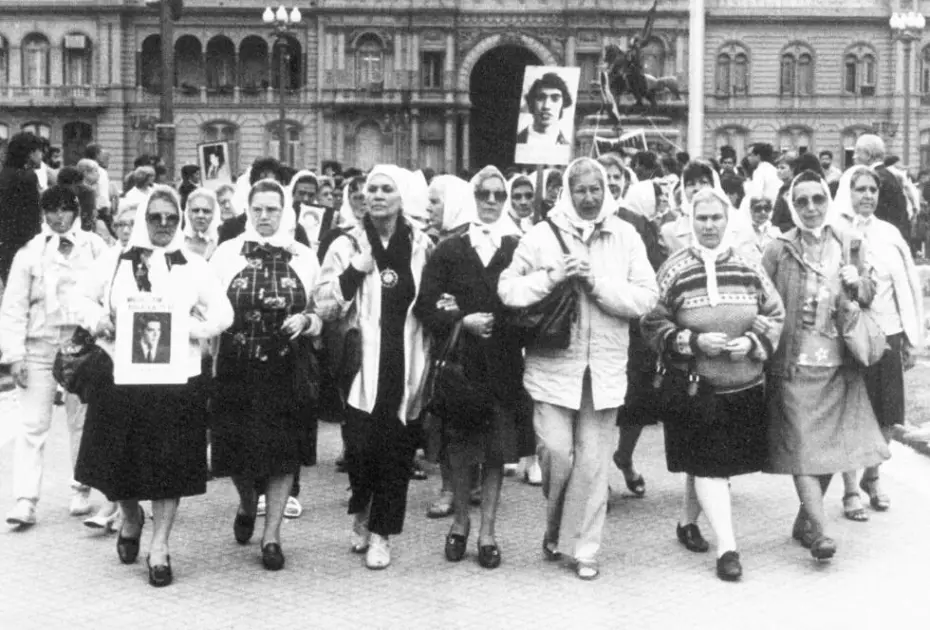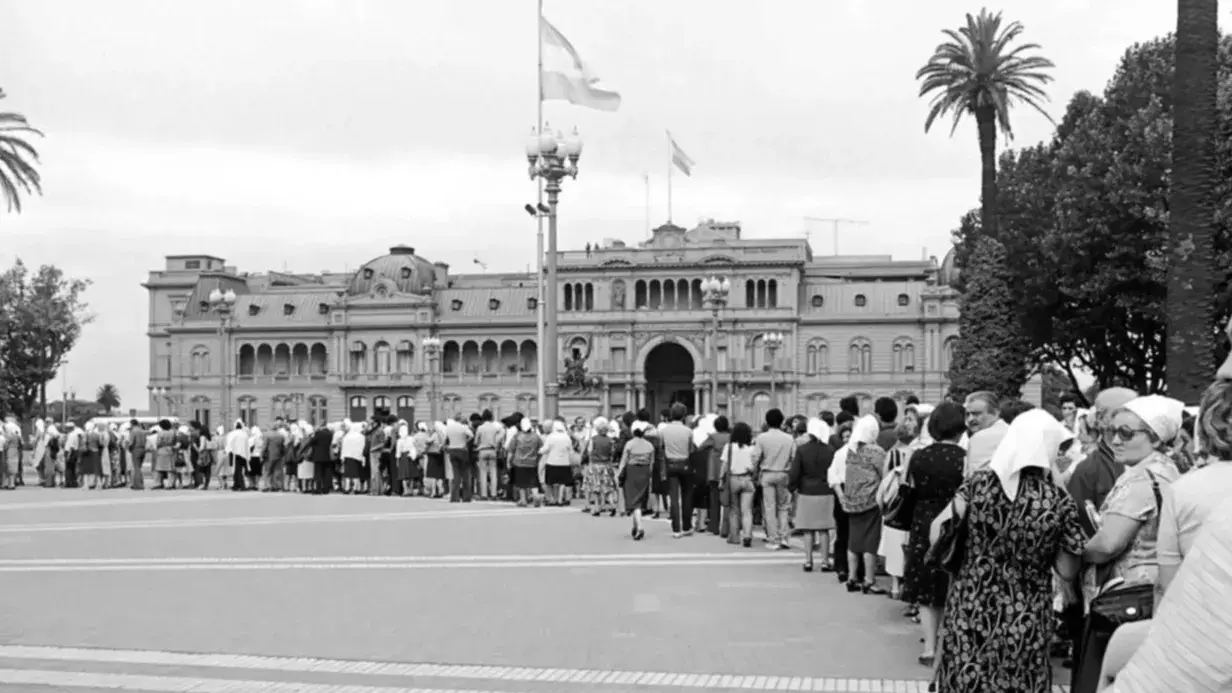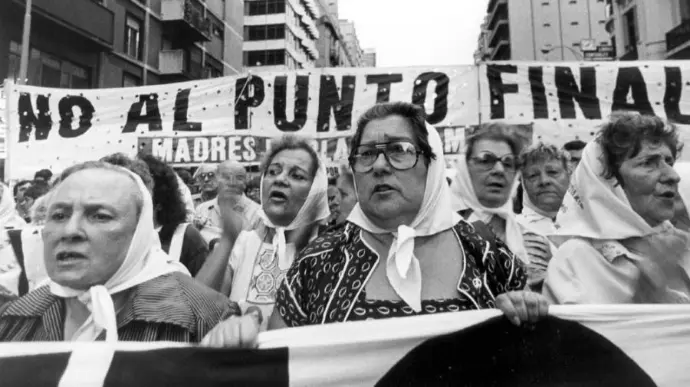The Struggle Continues: Mothers and Grandmothers of Plaza de Mayo and Their Tireless Quest for Justice
In our feature article, "The Struggle Continues: Mothers and Grandmothers of Plaza de Mayo and Their Tireless Quest for Justice," we will thoroughly explore the courageous work of these women in their tireless pursuit of justice. Prepare to dive into an in-depth analysis of human rights during dictatorships, uncovering the courage and determination of these true heroines. Read on and discover the unwavering struggle of the Mothers and Grandmothers of Plaza de Mayo for justice!

Background of the Mothers and Grandmothers of Plaza de Mayo
The origins of the Mothers of Plaza de Mayo date back to the 1970s, during the military dictatorship in Argentina. Amidst repression and the forced disappearance of thousands of people, a group of brave and determined women united to search for their missing sons and daughters. The iconic Plaza de Mayo in Buenos Aires became the epicenter of their demands, where they held weekly marches demanding justice and the return of their loved ones alive. This movement became a symbol of resistance and the fight for human rights.
The Mothers of Plaza de Mayo, known for their iconic white scarves, defied danger and intimidation to raise their voices against the oppression of the military regime. Their courage and determination inspired many others inside and outside Argentina, making them a beacon of hope in dark times.
At the same time, the Grandmothers of the Plaza de Mayo emerged with the goal of locating children who were kidnapped along with their disappeared parents. These women dedicated their efforts to searching for grandchildren born in captivity during the dictatorship, with the goal of restoring their identity and offering them a future free of lies and concealment.
The Mothers of Plaza de Mayo have remained steadfast in their struggle over the years, facing unimaginable challenges and obstacles. Despite threats, violence, and uncertainty, these courageous women have continued to demand justice, truth, and memory. Their perseverance has been instrumental in bringing to light the human rights violations committed during the dictatorship and in keeping alive the memory of their disappeared sons and daughters.
In addition to their actions in Plaza de Mayo, the Mothers have participated in international initiatives to promote human rights and have advocated for justice in various arenas. Their tireless pursuit of truth and justice has left an indelible mark on Argentine history and the global struggle for human rights.
The legacy of the Mothers of Plaza de Mayo transcends borders, serving as an inspiration for human rights movements around the world. Her determination and courage have demonstrated that the fight for justice and truth is inexhaustible, and that a mother's love transcends any obstacle.
The Grandmothers of the Plaza de Mayo, for their part, have carried out exceptional work in the search for grandchildren abducted during the dictatorship. Their tireless work has allowed for the restoration of the identity of more than 130 young people, giving them the opportunity to learn their true history and origins.
In addition to their search and restitution work, the Grandmothers of the Plaza de Mayo have advocated for justice and historical memory, promoting education about the importance of knowing the truth and respecting each person's identity. Their tireless work has had a significant impact on the defense of human rights and the construction of a more just and supportive society.
The Grandmothers of the Plaza de Mayo's commitment to truth and justice has transcended generations, demonstrating that love and care for the most vulnerable are fundamental pillars in the fight for a more humane and equitable world.
The struggle of the Mothers and Grandmothers of Plaza de Mayo has had a significant global impact, becoming a symbol of resistance and the fight for justice throughout the world. The tireless efforts of these courageous women have resonated beyond Argentina's borders, inspiring human rights movements in other countries and generating international solidarity.
The visibility they have given to the struggle to find their loved ones who disappeared during the Argentine military dictatorship has contributed to raising international awareness about human rights violations. Their testimonies and persistence have successfully placed the importance of truth, justice, and reparation for victims of enforced disappearances on the global agenda, marking a milestone in the history of human rights defense worldwide.
Furthermore, the example of the Mothers and Grandmothers of Plaza de Mayo has inspired other human rights groups around the world to raise their voices and demand accountability for crimes against humanity. His legacy transcends borders and continues to be a source of inspiration for those fighting against impunity and injustice in different contexts and realities.
Activism and the Search for Justice
The Mothers and Grandmothers of Plaza de Mayo are recognized for their iconic actions and demonstrations in their tireless pursuit of justice. Since 1977, these courageous women gathered weekly in Plaza de Mayo, Buenos Aires, to demand information about their children and grandchildren who disappeared during the military dictatorship in Argentina. Their peaceful resistance and determination to expose human rights violations amidst repression made them a symbol of the struggle for justice and truth.
The white scarf they wore around their heads became an emblem of resistance and the struggle for justice. These demonstrations spread to other cities in Argentina and had a significant impact on the country's social and political consciousness, generating international pressure to investigate the human rights violations committed during the dictatorship.
The actions of the Mothers and Grandmothers of Plaza de Mayo transcended Argentina's borders, inspiring other human rights movements in Latin America and around the world, becoming an example of peaceful resistance and the fight for justice.
The collaboration of the Mothers and Grandmothers of Plaza de Mayo with other human rights organizations has been fundamental in their pursuit of justice. Over the years, these courageous women have worked closely with local and international organizations to bring to light cases of forced disappearances, torture, and murders during the military dictatorship in Argentina.
This collaboration has strengthened pressure on the Argentine government to investigate and prosecute the crimes against humanity committed during that dark period in the country's history. It has also contributed to the collection of evidence, testimonies, and evidence that have been crucial in the judicial processes to prosecute those responsible for human rights violations.
Furthermore, collaboration with other organizations has allowed the reach of its message to expand, raising awareness among national and international public opinion about the importance of justice, memory, and truth regarding the crimes committed during the dictatorship.
The Mothers and Grandmothers of the Plaza de Mayo have made significant progress in their pursuit of justice over the years. Thanks to their persistence, more than 130 grandchildren who were abducted during the dictatorship have been identified and returned, a task that has been recognized nationally and internationally.
Furthermore, their tireless struggle has contributed to the conviction of several repressors and perpetrators of crimes against humanity, setting a precedent in Argentine judicial history and consolidating jurisprudence regarding crimes against humanity.
These achievements represent a moving testament to the importance of persistence, courage, and determination in the fight for justice, and demonstrate that, despite challenges and obstacles, it is possible to advance in the search for truth and justice for victims of human rights violations.
The Mothers and Grandmothers of the Plaza de Mayo continue to face significant challenges in their search for justice and truth. Despite the progress made, there are still many unresolved cases of enforced disappearances and a considerable number of grandchildren who have yet to be identified. Access to information about what happened during the military dictatorship remains limited, making it difficult to identify those responsible and obtain definitive answers for the affected families.
In this regard, one of the next important steps is to continue pressuring the authorities to provide full access to archives and documents related to the dictatorship. Furthermore, it is crucial to continue promoting international collaboration to identify grandchildren who were illegally appropriated during that period. Public awareness and human rights education are also critical to ensuring that future generations understand the importance of historical memory and the fight for justice.
Implementing policies that promote the protection of human rights and the prevention of future violations also represents an ongoing challenge. The Mothers and Grandmothers of Plaza de Mayo will continue to advocate for the need to strengthen democratic institutions and ensure that the fundamental rights of all citizens are respected and protected. The path toward justice and truth may be arduous, but these courageous human rights defenders are determined to continue their tireless struggle.
Legacy and International Recognition
The struggle of the Mothers and Grandmothers of Plaza de Mayo has had a significant impact on law and human rights in Argentina and around the world. Their tireless pursuit of justice and truth has led to important legal changes and the promotion of human rights protections in other countries.
In Argentina, their activism contributed to the repeal of impunity laws that protected those responsible for crimes against humanity during the last military dictatorship. Furthermore, their constant pressure and public visibility helped reopen numerous cases of forced disappearances and torture, allowing justice to be done and the truth to be known about the crimes committed.
Internationally, their work has inspired human rights movements in other countries, raising awareness about the importance of justice and memory in building democratic societies that respect fundamental rights.
The Mothers and Grandmothers of Plaza de Mayo have been widely recognized internationally for their courageous struggle and contribution to the defense of human rights. In 2010, they were awarded the Honorary Nobel Peace Prize in recognition of their tireless work in the pursuit of justice and truth for the victims of the dictatorship in Argentina.
In addition, they have received numerous awards and distinctions from international organizations, foreign governments, and human rights organizations, which have recognized their courage, perseverance, and commitment to justice and memory.
These awards not only honor the work of the Mothers and Grandmothers of Plaza de Mayo, but also serve as a global call for the protection of human rights and the eradication of impunity in cases of fundamental rights violations.
The struggle of the Mothers and Grandmothers of Plaza de Mayo has had a significant impact on the fight for justice globally. Her example of peaceful resistance, her tireless search for truth and justice, and her commitment to the memory of victims have inspired movements and organizations around the world.
Her influence has been reflected in the promotion of memory, truth, and justice policies in numerous countries that have faced periods of dictatorship or internal conflict. Her legacy has contributed to the creation of reparation mechanisms for victims, the identification of missing persons, and the prosecution of those responsible for crimes against humanity.
Furthermore, her work has served as a constant reminder of the importance of justice and memory in building democratic societies and preventing future human rights abuses.
Final Reflections on the Fight for Justice
The struggle of the Mothers and Grandmothers of Plaza de Mayo has left an indelible legacy in the history of Argentina and in the fight for human rights globally. Despite adversity and obstacles, these courageous women have maintained tireless resilience in their pursuit of justice for their loved ones who disappeared during the military dictatorship in Argentina. Their example has inspired similar movements in other parts of the world, demonstrating that determination and solidarity can have a lasting impact in the defense of human rights.
The perseverance of the Mothers and Grandmothers of Plaza de Mayo has led to significant changes in Argentina, including prosecutions for those responsible for crimes against humanity and the recovery of grandchildren who were illegally appropriated during the dictatorship. Their legacy continues to be a source of inspiration for present and future generations, reminding us that the fight for justice and truth is a constant commitment that transcends the barriers of time.
The tireless work of the Mothers and Grandmothers of Plaza de Mayo teaches us that, despite the difficulties, the search for justice is an act of resistance that knows no limits. Their example invites us to reflect on the transformative power of collective memory and the lasting impact of the struggle for human rights on society.
The lessons learned from the struggle of the Mothers and Grandmothers of Plaza de Mayo have a reach that transcends the borders of Argentina. The importance of keeping memory alive, tirelessly pursuing justice, and fighting against impunity has been a beacon of hope for human rights movements around the world.
These lessons have been applied in diverse contexts, from the search for the disappeared in Latin American dictatorships to the defense of minority rights on other continents. The solidarity, courage, and resilience demonstrated by the Mothers and Grandmothers of Plaza de Mayo have inspired social movements in situations of conflict and oppression, serving as an example that the struggle for justice is universal.
The story of the Mothers and Grandmothers of Plaza de Mayo reminds us that solidarity and collective action are fundamental to generating significant changes in the defense of human rights. Their lessons continue to be a source of inspiration for those fighting for truth, justice, and reparation in different parts of the world.
The legacy of the Mothers and Grandmothers of Plaza de Mayo represents a beacon of hope in the fight for global justice. Their tireless pursuit of truth and justice has set a precedent in the defense of human rights, inspiring present and future generations to continue the fight for justice and remembrance.
In a world marked by impunity and injustice, the example of the Mothers and Grandmothers of Plaza de Mayo urges us to continue forward in the search for truth and justice, regardless of the difficulties that arise along the way. Their legacy will endure as a reminder that the fight for human rights is a constant commitment that requires courage, solidarity, and determination.
The future of the fight for global justice lies in the continuity of the ideals and resilience demonstrated by the Mothers and Grandmothers of Plaza de Mayo. Their legacy will endure as a beacon of hope for those who seek a more just, equitable world that respects the fundamental rights of all people.



